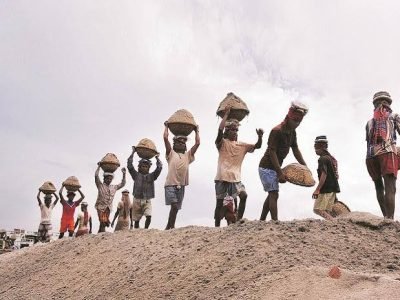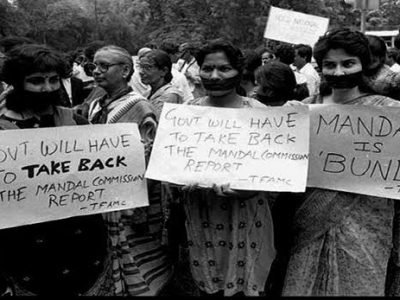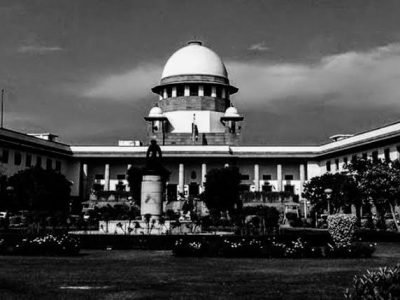
Author: Aparna Bhatnagar, 1st year student at Maharashtra National Law University, Mumbai.
Bhagwati Prasad Dixit v. Rajeev Gandhi
INTRODUCTION
The case of Bhagwati Prasad Dixit v. Rajeev Gandhi[1]Election Petition 7 of 1985, was filed as an appeal to the judgement of the High Court of Allahabad under section 116A of the Representation of People Act, 1951 (hereinafter referred to as The Act). Both the appellant and the respondent had contested for the general elections from Amethi Parliamentary Constituency in Uttar Pradesh. The election result, declared on 28 December 1984, declared the respondent to be the winner. The appellant challenged his candidature as well as the validity of the election result in the aforementioned Election Petition before the High Court on three grounds.
This case is important in India’s legal history because it marks a change in the reasoning that the Courts adopted till that point of time and establishes a concrete separation of powers between the judiciary and the executive.
Essential Details of the Case:
- Case Citation: 1986 SCC (4) 78
- Petitioner(s): Bhagwati Prasad Dixit ‘Ghorewala’
- Respondent(s): Rajeev Gandhi
- Petitioner’s Lawyer(s): Bhagwati Prasad Dixit, in person
- Respondent’s Lawyer(s): Y.S. Chitale, M.R. Sharma, S.C. Maheshwari, Dalveer Bhandari and Rachna Joshi
- Concerned Statues and Provisions:
- Representation of the People Act, 1951- ss. 80 & 100
- Citizenship Act, 1955/Citizenship Rules, 1956- s.9 (2)
- Constitution of India- Article 102(1)(a), Article 102(1)(d), Article 324(5)
- Bench: E.S. Venkatramiah, M.P. Thakkar
- Date of Judgement: 25 April, 1986
- Present Status: Decided
FACTS OF THE CASE
Both the appellant and the respondent had contested the general elections from Amethi Parliamentary Constituency in Uttar Pradesh. The election result, announced on 28 December 1984, declared the respondent to be the winner. The appellant challenged the respondent’s candidature as well as the legality of the election result in the aforementioned Election Petition before the Allahabad High Court on three grounds. First, the act of marriage and acquisition of property in a foreign land (Italy) by the respondent disqualified his candidature under Article 102(1) (d) of the Constitution of India[2]. Second, the act of drawing salary and other allowances by virtue of being a member of Parliament constitutes a house of profit, thus disqualifying the candidature of the respondent as per Article 102(1)(a)[3]. Third, since the process of removal of the Chief Election Commissioner is the same as that of a Supreme Court judge, as provided in Article 324(5) of the Indian Constitution[4], it implies that the qualifications of the Chief Election Commissioner must also be the same as that of a Supreme Court judge. The appellant contended that since Shri R.K. Trivedi did not fulfil the required eligibility criteria, the country wide elections held under his Commissionership should be declared void.
ISSUES RAISED
- Whether the High Court exercises jurisdiction over election petitions regarding determination of citizenship of a person.
- Whether membership of either Houses of the Parliament constitutes an office of profit under the Government.
- Whether the qualifications for the office of Chief Election Commissioner are the same as the qualifications for the office of a judge of the Supreme Court.
ARGUMENTS FROM THE PETITIONERS:
- It was argued by the appellant that the respondent had been married to an Italian woman and had acquired property in an overseas land (Italy) during the course of their relationship. This, the appellant argued, constituted an act of forfeiture of Indian citizenship, and prayed that the respondent’s candidature be cancelled since Indian citizenship is a requisite criteria for contesting elections.
- The appellant argued that while clause 2 of Article 102 provides that any office held by a minister of the Central or State Government shall not be considered to be a house of profit, it did not expressly include a salary drawing member of Parliament within this exception. Therefore, the respondent, who was a salary drawing member of Parliament at the time of elections, must be disqualified.
- The appellant argued that since the procedure of removal of Chief Election Commissioner from his/her office was akin to that of the removal of a Supreme Court judge, the requisite qualifications for the post of the Chief Election Commissioner must also be identical to those of a Supreme Court judge. Due to the lack of such appropriate eligibility criteria, the elections conducted under the then Chief Election Commissioner must thus be declared void.
ARGUMENTS FROM THE RESPONDENTS:
- The respondents argued that in the absence of any law expressly stating that marriage with a foreign citizen or acquisition of property in a foreign land would lead to a termination of Indian citizenship, the Court should construe these acts as immaterial to the status of one’s citizenship.
- The respondents argued that the arguments of the appellant were untenable in the court of law.
- The respondents argued that the arguments of the appellant were untenable in the court of law.
JUDGEMENT HELD
- When a question of determining the status of citizenship arises out of an election petition before the High Court, it shall have no jurisdiction over the matter. The Court must proceed with the decision given by the appropriate authority under Section 9(2) of the Citizenship Act, 1955[5].
- Membership of either Houses of the Parliament does not constitute an office under the government. Thus, it cannot be a valid ground for the disqualification of a candidate.
- Election petitions must disclose a precise and unequivocal cause of action, the absence of which is a valid ground for dismissal of the petition.
Reasoning provided for said judgement
The appellant had argued that as per Article 102(1)d of the Indian Constitution[6], the forfeiture of Indian citizenship disqualified a person’s candidature in the general election. Although the respondent’s citizenship under Article 5 of the Constitution[7] was not disputed, there was also no decision given by the competent authority under the Citizenship Act of 1955 regarding his forfeiture of the said citizenship. The Allahabad High Court, while hearing the Election Petition no. 7, held the Court to be the competent authority as per Section 9(2) of the Citizenship Act, 1955[8] to determine the citizenship status of the respondent, and concluded that the respondent’s Indian citizenship had not been terminated by virtue of marrying an Italian woman and acquiring property in an overseas land.
The Supreme Court, however, disagreed with the line of reasoning of the High Court that granted itself competency to adjudicate on matters of citizenship, and ruled that the High Court lacked jurisdiction on the same. It was observed that Sections 18(h)2[9] and 9(2)[10] of the Citizenship Act 1955, confer on the Union Government, the power to determine the validity of voluntary acquisition of citizenship and concomitantly, the status of a person’s citizenship. According to Rule 30 of the Citizenship Rules, 1956,[11] it is the Central Government that acts as the authority to decide on such a question. Consequently, no other authority, judicial or otherwise, has the power to conclusively determine whether the termination of Indian citizenship is valid in the eyes of law.
In The State of M.P. v. Peer Mohd.[12]Justice Gajendragadkar observed that the question of the abdication of citizenship has to be adjudicated by a competent authority as per Section 9 (2). He further noted that such a competent authority may be the Union Government or its delegate, emphasising that “this means this particular question cannot be tried in courts.” This was affirmed in the State of U.P. v. Shah Mohammad[13]. In The Government of A.P. v. Syed Mohd. Khan, it was held, among other things, that “The Central Government’s decision on the person’s citizenship status serves as the foundation for any further action taken against him.”[14]
In the present case, the Supreme Court reasoned that long standing percents rightly established that the Central Government, by virtue of the power conferred on it by Section 9(2) of the Citizenship Act, 1955,[15] is the exclusive authority to adjudicate on matters of determining accession or cessation of citizenship. It follows that, in absence of a decision by the Union government or its delegate under section 9(2) of the Citizenship Act, the Court shall presume the person to be of Indian citizenship.
The Court observed that the intent behind the enactment of section 9(2) was to shield a person from frivolous suits from ‘all forums of society’, and thus the decision must be taken by a single centralised authority. In light of this, the High Courts must always adhere to the decision of the Central Government regarding the status of citizenship and cannot hold an independent inquiry into the question on its own volition. By stating this, the Court affirmed a similar line of reasoning adopted by the Calcutta High Court in Birendranath Chatterjee v. State of West Bengal[16]. Further, the court concluded that since no provision in law provides that marriage with a citizen of overseas citizenship or acquisition of a property in a non-native land would lead to the termination of said person’s Indian citizenship, the plea was untenable.
The second ground mentioned in Election Petition number 7 was that a person becomes disqualified for membership of either House of parliament in case he is in receipt of parliament salary and allowances. Section 14(2) of the Representation of People Act, 1951[17] is regarding the notification for general election to the House of people. It lays down the procedure for holding of the general elections for the purpose of constituting a new House of People. However, it provides that such an election must not be held earlier than six months prior to the dissolution of the House. The duration of the House of People is governed by clause 2 of Article 83 of the Act[18]. Furthermore, section 73 of the Act [19]calls for the publication of the results of the general election prior to the conclusion of the duration of the existing Lok Sabha. However, as per the proviso under Section 73, the notification of the results shall not affect the term of the House of People operating prior to that.
As per Article 102(1)(e) of the Indian Constitution[20], any person holding ministership under the Union Government of India or that of any State shall not be deemed to hold a house of profit under the Government, and thus, would not be eligible for disqualification of membership of either Houses. Further, Article 106 the Constitution[21] provides that members of either House of parliament shall be entitled to receive remuneration and benefits as decided by the Parliament through legislation. The Court noted that the dissolution of existing Lok Sabha was not a condition precedent, for holding of elections, observing that ‘if the membership of either House of Parliament is an office of profit within the meaning of Article 102(1)a, then there can be no members of Parliament at all, because all members of Parliament entitled to receive salaries and allowances.’ The Court held that Article 102(1) and Article 106 must be interpreted by way of harmonious construction. Such a reading provides that the receiving of salary or allowances by the member of Parliament cannot be held to be tantamount to holding of a house of profit, and thus cannot be construed as a ground for disqualification from either House of the parliament.
Article 324(5) of the Constitution[22] provides that the Chief Election Commissioner can only be removed from office in accordance with the procedure established for the removal of the judges of the Supreme Court. The appellant’s claim that Article 324(5) implies that the eligibility criteria for Supreme Court judges must also be applicable to the eligibility of Chief Election Commissioner were outrightly rejected by the Apex Court. The Court went on to hold that an election petition must be unambiguous and must provide a clear cause of action. In the absence of such prerequisites, the Court felt that all the grounds listed by the appellant were ‘vexatious’. The petition, thus, was dismissed by the Supreme Court of India.
CRITICAL ANALYSIS
Although the Supreme Court arrived at the same conclusions as those reached by the Allahabad High Court, the reasoning employed was widely different. While the High Court assumed the role of the competent authority established under Article 9(2) of the Citizenship Act, 1955, for adjudicating on matters related to forfeiture of citizenship, the Supreme Court rightly corrected this misguided approach by pointing out that such an authority was conferred solely on the Union government and its delegates, to the exclusion of all other authorities. . In this context, this case must be seen as a bulwark against judicial overreach, and establishing judicial accountability. On other accounts, the case concretized the principles developed by judicial precedents, such as requirements of unambiguity and a cause of action in election petitions. The case of Bhagwati Prasad Dixit v. Rajeev Gandhi has found its place amongst notable cases of the Indian legal history.
REFERENCES
- Bhagwati Prasad Dixit v. Rajeev Gandhi, 1986 SCC (4) 78. ↑
- INDIA CONST. art. 102, cl.(1) d. ↑
- INDIA CONST. art. 102, cl.(1) a. ↑
- INDIA CONST. art. 324, cl.(5). ↑
- The Citizenship Act, 1955, § 9(2), No. 57, Acts of Parliament, 1955 (India). ↑
- INDIA CONST. art. 102, cl.(1) d. ↑
- INDIA CONST. art. 5. ↑
- The Citizenship Act, 1955, § 9(2), No. 57, Acts of Parliament, 1955 (India). ↑
- The Citizenship Act, 1955, § 18(h)2, No. 57, Acts of Parliament, 1955 (India). ↑
- The Citizenship Act, 1955, § 9(2), No. 57, Acts of Parliament, 1955 (India). ↑
- The Citizenship Rules, 1956, Rule 30. ↑
- The State of M.P. v. Peer Mohd., AIR 1963 SC 645. ↑
- State of U.P. v. Shah Mohammad, (1969) 1 SCC 771. ↑
- Government of A.P. v. Syed Mohd. Khan, AIR 1962 SC 1778. ↑
- The Citizenship Act, 1955, § 9(2), No. 57, Acts of Parliament, 1955 (India). ↑
- Birendranath Chatterjee v. State of West Bengal, 1968 SCC OnLine Cal 21. ↑
- The Representation of the People Act, 1951, § 14 (2), No. 43, Acts of Parliament, 1951 (India). ↑
- INDIA CONST. art. 83, cl.2. ↑
- The Representation of the People Act, 1951, § 73, No. 43, Acts of Parliament, 1951 (India). ↑
- INDIA CONST. art. 102, cl.(1) a. ↑
- INDIA CONST. art. 106. ↑
- INDIA CONST. art. 324, cl.5. ↑







